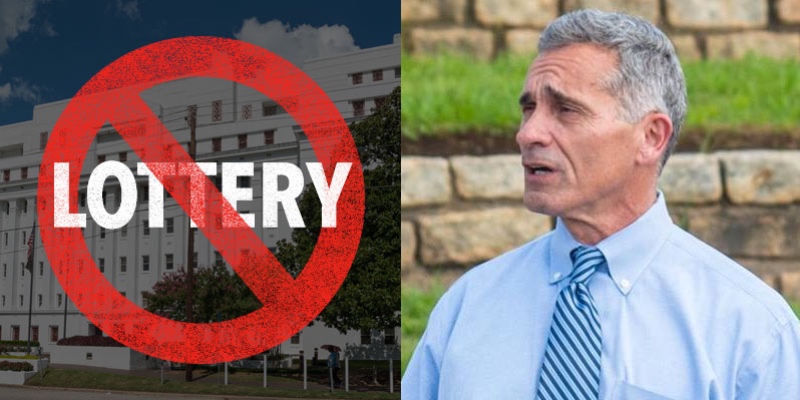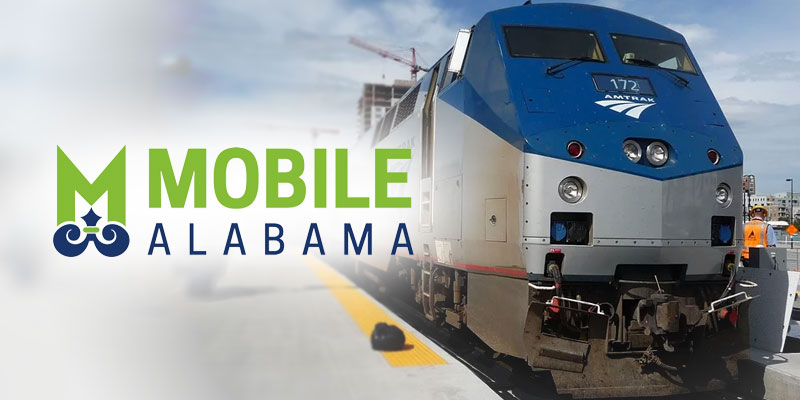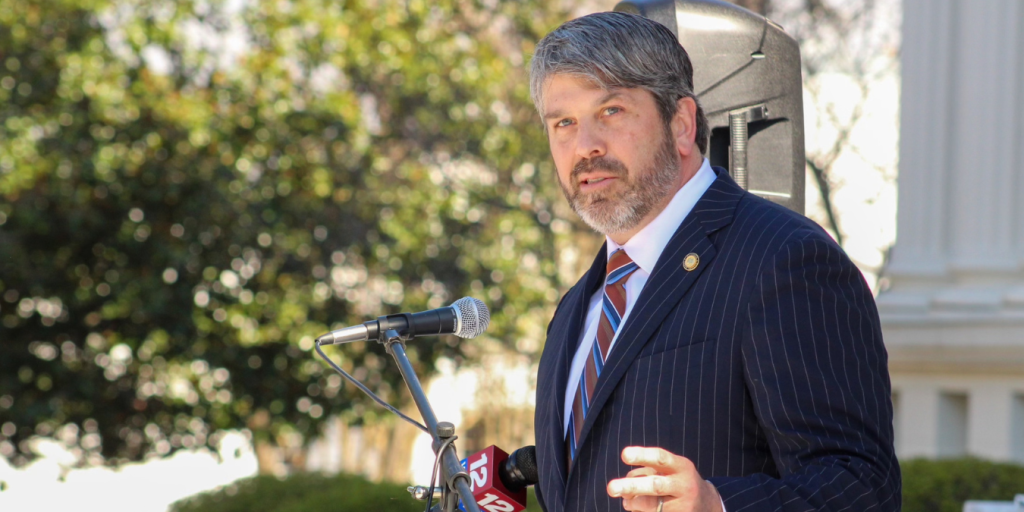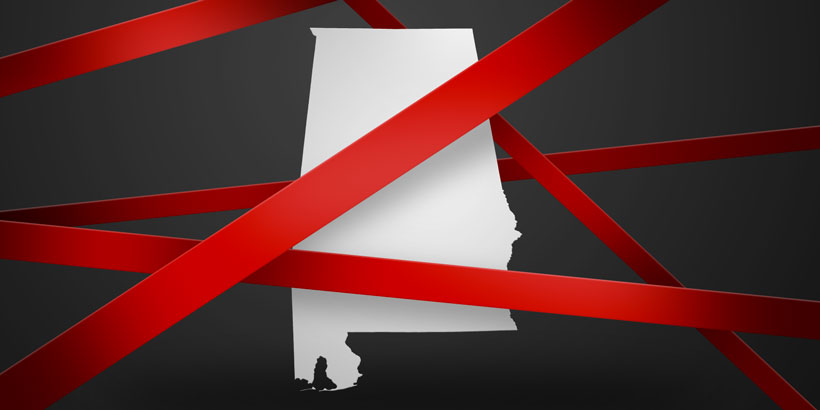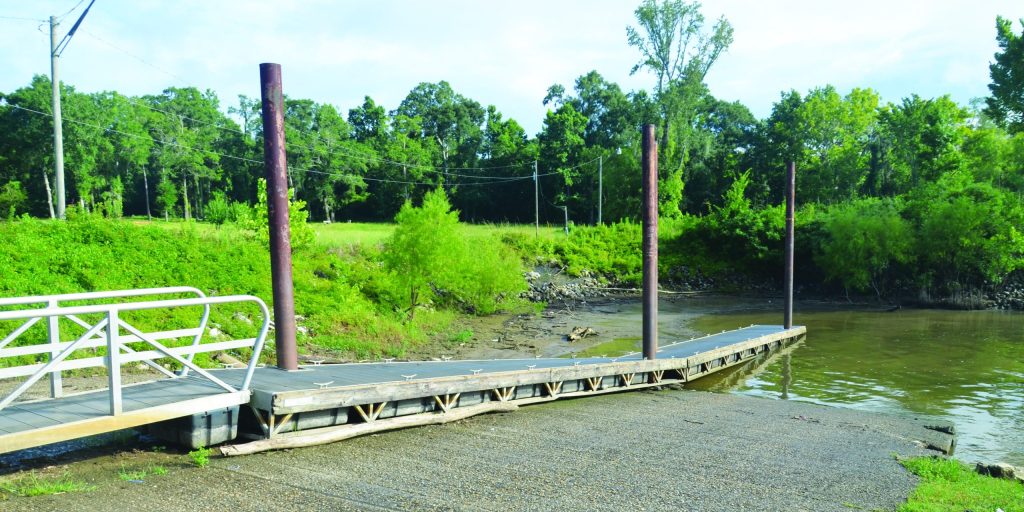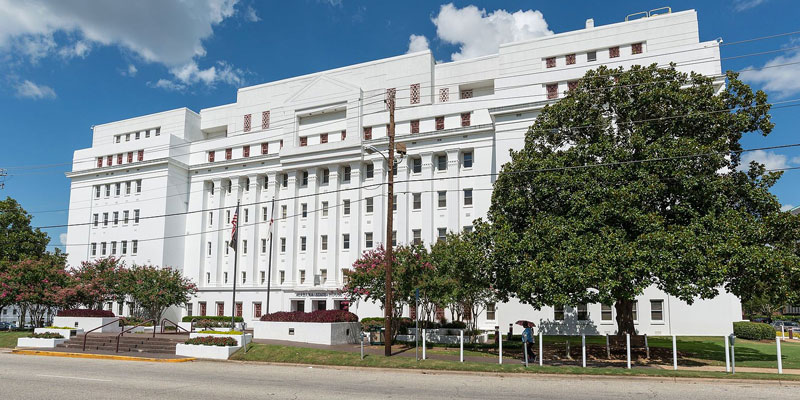MONTGOMERY — In separate interviews immediately following the end of the Alabama legislature’s 2019 regular session, Senate President Pro Tem Del Marsh (R-Anniston) and House Speaker Mac McCutcheon (R-Monrovia) both discussed the lottery proposal that died in the lower chamber in recent weeks.
SB 220, sponsored by State Sen. Greg Albritton (R-Atmore), was considered a “clean,” paper-only lottery proposal that political observers viewed as the best chance for a Yellowhammer State lottery in decades.
As a constitutional amendment, the proposal would have gone to a referendum on the state’s March 2020 primary election ballot. However, after passing the Senate with just the minimum threshold required, the lottery legislation was defeated in the House on a procedural vote.
While Marsh said the 2019 regular session was broadly one of the most productive in his time in the legislature, he expressed that the lottery failing to advance to a vote of the people was a significant disappointment.
Marsh advised that the legislature’s success started with passing the Rebuild Alabama Act in a special session and that this momentum continued into the regular session.
“I look at it as one of the best sessions I’ve ever seen,” he summarized.
However, not every priority was accomplished.
“The one thing I wish had happened: at the end of the day, I wish I could’ve gotten to the people, the voters of this state, the opportunity to vote on a straight lottery,” Marsh lamented.
“The Senate passed that bill,” he continued. “It went to the House. Unfortunately, it never got up for a [final] vote in the House. I wish the people would’ve had that opportunity. And, it would’ve, in my opinion, eased some pressure on the state General Fund going forward.”
Ultimately, while the state had a very good year for both budgets this time around, things do not look so rosy going forward, as major financial obligations like the Children’s Health Insurance Program (CHIP) and the corrections/prisons crisis are set to increase by huge amounts.
House Ways and Means General Fund Chairman Steve Clouse (R-Ozark) this week said there are “real thunderstorms” on the horizon for the General Fund.
One of these major issues could be addressed in another special session later this year. Rumors have persisted that Governor Kay Ivey is set to call a special session for the prison system in October, but McCutcheon on Friday said he is still hesitant to forecast exactly when that special session will be.
While much more needs to be overhauled at the Alabama Department of Corrections policy-wise, one big-ticket expenditure is expected to be the construction of new men’s prisons in the state. The logistics of that, and how the state pays for it, is a looming legislative battle — with a consensus seemingly far off still.
When asked by a reporter on Friday, Marsh said the lottery could play into this discussion on prisons, as the need for significant new revenue seems inevitable regardless of what the final corrections plan will look like.
“There’s no doubt there’s going to be financial requirements [for prisons]… I think the lottery is an option,” Marsh said.
‘The issue of politics’
McCutcheon called the 2019 session “very good,” saying the legislature did not run away from the “tough issues” this year.
He and Marsh both outlined that the legislature did take steps to improve the prison system during the regular session, including an important Board of Pardons and Paroles reform bill, funding for 500 new corrections officers in the General Fund budget and legislation to provide a two-step pay increase for DOC officers.
McCutcheon expressed optimism that giving legislators more time will ultimately lead to better outcomes for a comprehensive corrections reform package.
“The thing that I would hope as we move into the summer is that we get away from the political, legislative pressure of trying to promote legislation in a hurry,” the speaker said. “And we start looking at all of these areas — and we start looking at ways we can fix the problem.”
He added that a “cooperative effort” between the U.S. Department of Justice, the governor’s office and the legislature will be key.
“I think by the time we get into the fall and the end of this year, I think you’re going to see some significant pieces of legislation, as well as some plans moving forward that will help us,” McCutcheon advised.
He noted the legislature has already been “discussing ways that we can fund” corrections improvements.
“These issues are going to come with a price tag,” McCutcheon emphasized. “And we’re going to have to find out – or find out how – that we can address some of these issues with the funding that we need.”
He said this looming “price tag” was even discussed in this year’s General Fund conference committee, with legislative leaders talking about planning ahead for the “corrections cost that’s going to be coming.”
“So, it’s top priority,” McCutcheon continued, saying the General Fund will have a “very difficult” time next year between corrections and CHIP.
He did not single out any ideas for raising new revenue for corrections, but later in the interview McCutcheon discussed the lottery dying in the House.
Asked about the “major obstacles” that prevented the lottery from passing the chamber, the speaker said, “I think there were several issues out there.”
“Of course, you always have the issue of politics,” McCutcheon continued. “You’ve got the different governing bodies, between the Democrats and Republicans and different philosophies of how they think we should [raise] revenue. You had the issues of the rural healthcare, Medicaid expansion, food tax. There were all of these debates out there.”
One of these points of debate was allocating lottery revenue. The Senate-passed version of SB 220 gave all of the proceeds to the General Fund, while the supposed “compromise” substitute version approved by a House committee would have sent 25% to the Education Trust Fund. However, there were influential legislators who wanted a 50/50 split, or even more than half of the revenues going to education.
While McCutcheon extolled the “methodical” nature in which the House examined the lottery, it sounds like perfect may have been the enemy of good.
“Then you got into the discussion of, ‘If you’re going to put it into education, what’s it going to fund in the education budget?’ Then there was the scholarship program that was being discussed. And then there was, ‘Was there enough money being transferred over to education?’ Then you had the debate between, ‘Well, the General Fund is going to need money for the corrections [system],’ and that became a discussion. And I think through all of the discussions and the fact that the House was being methodical about each piece of legislation, I personally welcomed that – I didn’t want to try and push that bill or rush that bill through, and as you got into discussion, there were just not enough votes there,” McCutcheon explained, saying he did not have the “feeling like everybody was unified enough to pass a lottery bill the way it was proposed” and considering “the issues we were facing.”
When asked, he added that respective bills to legalize electronic bingo in Macon and Greene Counties popping up while the House considered the lottery did not help SB 220’s chances of passage.
‘Medicaid expansion is a component of having good rural healthcare’
McCutcheon also noted that Medicaid expansion became a major point of discussion in the House debate over where lottery revenues would go.
He emphasized a promise was never made during Rebuild Alabama Act consideration between House Republican leadership and the minority caucus to expand Medicaid.
However, McCutcheon explained that the discussion over rural healthcare and the potential of Medicaid expansion was an ongoing issue for the House.
“We’re going to continue to have those discussions, because I think Medicaid expansion is a component of having good rural healthcare,” the speaker said. “Not to say we have to have Medicaid expansion, but you can’t have discussions about rural hospitals and rural healthcare without at least talking about Medicaid. And, so in that, there’s a discussion that needs to be taking place.”
Marsh told House Minority Leader Anthony Daniels (D-Huntsville) in a recent meeting (while SB 220 was still alive) that Medicaid expansion was not currently a financial possibility for the state’s General Fund but that lottery revenues could make Medicaid expansion a realistic option in Alabama.
McCutcheon on Friday acknowledged that cost was an obstacle right now to Medicaid expansion becoming a more “serious” discussion.
“There’s a cost involved,” he stressed.
Overall, McCutcheon graded the 2019 regular session as an “A minus.” Marsh gave it between a “B plus” and an “A minus.”
Sean Ross is a staff writer for Yellowhammer News. You can follow him on Twitter @sean_yhn




